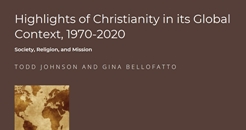 The Church and the World
The Church and the World
From a report by Lausanne Movement
In a fast-paced talk at a Lausanne Conference in 2013, Gina Bellafatto, a doctoral student in Boston gave a 9 minute 'state of the world' address based on a then recently released report, 'Christianity in its global context 1972-2020 - society. religion and mission'. Although given a few years back, the period she covered was up to 2020 so the projections are still relevant today.
Christians around the world today find themselves in very different contexts than they did 40 years ago and this forces Christians to think differently about the people among whom they live and work, the ways in which they interact with them and the potential for future cooperation.
Based on 'the whole church taking the whole gospel to the whole world', here are some report highlights:
The whole church:
-
The whole church includes all Christians - 2.3 billion Christians in all traditions.
-
There were 18.800 Christian denominations in the world in 1970 and this number rose to 41,000 by 2010 by 2020 it is anticipated there will be 50,000 Christian denominations. This has huge implications for cooperation and fragmentation remains a challenge for Christians around the world.
-
The shift to the global south has been well documented. In 1970 41.3% of all Christians lived in Africa, Asia and Latin America and by 2020 this figure is expected to be 64.7%. The Church there has grown more rapidly than the general population.
-
Pentecostals, charismatics and independent charismatics have grown at nearly four times the growth rate of global christianity. in 1970 these Christians represented 5% of global christianity but today they represent 26%.
-
Evangelicals - these have also seen similar growth rates. There were about 98 million evangelicals in 1970 and over 300 million today.
The whole gospel to the whole world:
-
The number of unevangelised individuals was estimated at 1.8 billion in 1970 which was 44% of the world's population. By 2010, this rose to 2.0 billion but this was only 29% of the world's population. So even though population growth is increasingly outpaced by evangelistic efforts the percentage of unevangelised individuals worldwide is dropping.
-
There are key social issues facing the world and the Church. One of these is serving the poor. The poorest children have made the slowest progress in terms of improved nutrition and hunger remains a global challenge. Between 2006 and 2009, 850 million people around the world still lived in hunger - 16% of the global population. Even though extreme poverty has decreased, progress has been slow when addressing child malnutrition in particular. In 2010, nearly one in five children globally was underweight including one third of children in southern Asia.
-
Christian presence in slums in particular is disproportionately small. One in six people globally live in slums but it's estimated that only one out of 500 Christians missionaries works in the slums. Going a step further, only a tiny fraction - perhaps one in 10,000 - of national workers such as pastors work in slums in their own countries.
-
The percentage of the world that is religious continues to increase. In 1970 around 80% of the world's population was religious. By 2010, this had risen to 88% and by 2020 it is estimated that 90% of the world will be religious.
-
In 1970 Christianity and Islam together represented 49% of the global population but by 2020 it is estimated that they will likely represent 57%. So Christianity and Islam will continuing to be the two largest religions in the world but Islam is growing at a faster pace in many places.
-
It's estimated that 81% of all people in the world do not personally know a Christian due the dominat religion in their countries. .
Suggested actions:
Civility and hospitality - seeing others as equally made in God's image and worthy of love and respect is integral to the Christian message and the message of Jesus is strengthened by the civility that is practiced towards adherents of other religions and also towards members of other denominations.
Think of evangelism and social action together as a unit both globally and locally. There's no lack of opportunity for Christians to share their faith and be involved in social action local ministries. Organizations are knowledgeable about the needs of their own communities and generally have resources and are connected to volunteers.
Deepen our knowledge and interaction with people of other world religions as we see the world is becoming more and more religious and more and more diverse. Reaching out to adherents of other faiths is strengthened when both those who are sending and those who are sent better understand the religions of the world including their history, significant figures, theologies, beliefs and practices.
Watch the 9 min video here:
Download the report here.
Retweet about this article:
From a report by Lausanne Movement, 19/12/2017